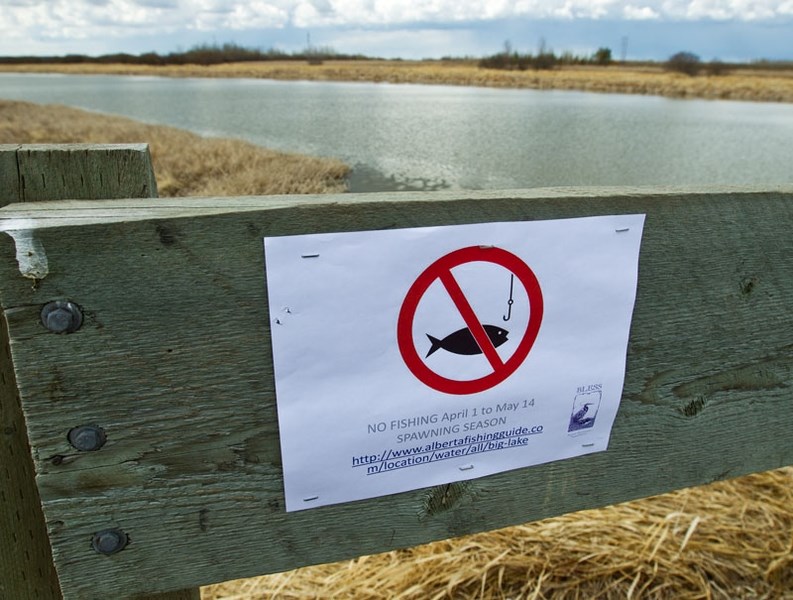Local anglers should hold off on fishing in the Sturgeon this month if they want to avoid a ticket.
The Big Lake Environment Support Society posted “no fishing” signs along the Sturgeon River earlier this week after several people were caught and fined for angling under the Ray Gibbon Drive bridge.
Under provincial law, it is illegal to fish in the Sturgeon River and/or the lakes and streams that feed into it from April 1 to May 14.
The ban is to give fish time to spawn, said Dennis Prodan, district officer with Edmonton Fish and Wildlife Enforcement. His officers issued about four tickets in the Big Lake region for illegal fishing earlier this month.
BLESS president Al Henry said his group decided to put up signs to alert residents to this rule.
“The parks rangers are out and they will ticket.”
Illegal fishing is a common problem in this region at this time of year, Henry agreed.
“A lot of guys don’t read the regulations,” he said, while others don’t have fishing licences.
You need to have a valid fishing licence and to follow the Alberta sport-fishing regulations before you can legally cast your line, Prodan said. The regulations are different for every water body, and sometimes differ for parts of the same water body, so it’s important to read them carefully. Those that don’t can be fined $115 and face a possible court appearance.
Prodan noted that the North Saskatchewan River and the part of the Sturgeon from RR 825 to the North Saskatchewan are open for fishing year-round.
Fishing in the Sturgeon generally isn’t a good idea given that it has multiple sewage lagoons and farms draining into it, Henry added.
“It’s got everything in it you don’t want to be eating.”
You can find the sport-fishing regulations at albertafishingguide.com.
Don’t want to walk to Big Lake? You can drive there as of today.
Alberta Parks spokesperson Tim Chamberlin confirmed that the Lois Hole Centennial Provincial Park parking lot was open for business as of April 15.
That should help more people get to the park and the boardwalk, meaning more attention and less vandalism for both, Henry said.
“That’s rather good news for improving the lake.”
The parking lot itself has been complete for months, but up until Friday was blocked behind a locked gate.
When asked why, Chamberlin said the park was a seasonal operation, and they typically don’t have seasonal staff (such as the person who will now maintain the parking lot) before spring. That means this parking lot will usually only be open from about May to late October.
That’s unfortunate, as you get some of your best bird-watching at the lake in around January and February, Henry said. On the other hand, that means more visitors will have to come through St. Albert to get to the lake during those months.
The parking lot is located at LeClair Way and Ray Gibbon Drive.
Albertans need to take a close look at their social values if they’re to successfully transition to renewable energy, says a University of Alberta scholar.
The U of A and Universities Canada are hosting a free public forum Monday on the future of energy systems.
The talk is part of a series of forums being held to connect scholars to governments and NGOs, said Imre Szeman, who holds the Canada Research Chair in cultural studies at the U of A and is a speaker at the forum. Given the nature of Alberta, it made sense to hold a forum on energy here.
Szeman is co-director of the Petrocultures Research Group and studies the social and cultural implications of oil and energy.
“We tend to think about energy as a neutral input,” he said, but a society’s source of energy has great influence over its thoughts and actions.
For example, we currently value mobility due to how fossil fuels let us travel fast and cheap, and that encourages us to want to own cars. But if all we do is switch from gasoline to electric cars, we’ll still be using a huge amount of resources.
“If we stick with the idea of unlimited mobility, we’re not going to get where we want to be.”
Getting off fossil fuels and avoiding the problems that come with using them means re-examining our values, Szeman explained. If what you value is mobility, for example, you don’t necessarily need to own a car to get it. Many young Vancouverites have turned to public transit and ride-share programs (which often use hybrid cars) to get around, saving them the cost of ownership.
The forum runs from 9:30 a.m. to 12:30 p.m. Monday at the Telus Centre for Professional Development at 111 St. and 87 Ave. in Edmonton. Visit www.univcan.ca/mindshare/whats-fuelling-our-future for details.




